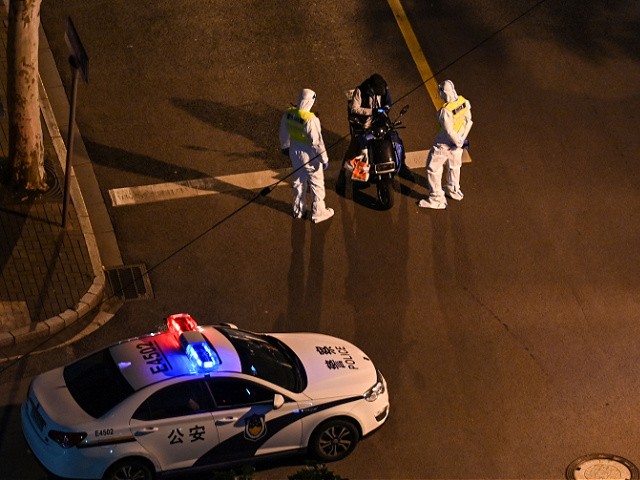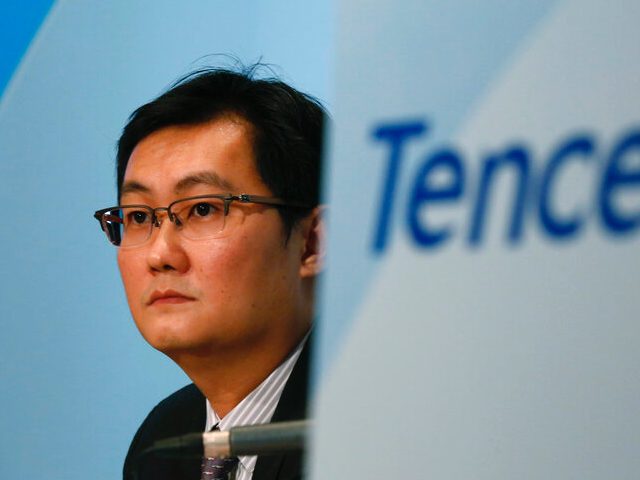Ma Huateng, the billionaire co-founder of the Chinese company Tencent Holdings Ltd, reportedly shared and endorsed an essay privately on a Chinese social media network condemning the Chinese Communist Party’s “Zero-Covid” policy this week.
The founder and CEO of Tencent, more commonly known as Pony Ma, reportedly shared the post on his WeChat account, writing that it was a “really vivid” description of the economic disaster the Communist Party created by insisting on locking down its largest city and financial hub, Shanghai, and several of its largest industrial centers. WeChat is a heavily censored social media outlet akin to the Western application Whatsapp. Tencent owns WeChat.
According to the South China Morning Post, Ma shared the post privately, but a screenshot of his message began circulating widely on the network.
The essay, now disappeared from Chinese social media, was titled “Nobody Cares About the Economy Except Hu Xijin” and written by Zhang Mingyang, who the Post described as an “independent commentator.”
Hu Xijin is one of China’s most prominent propagandists, the former top editor of the Global Times government propaganda outlet who departed his post shortly after trying and failing to silence the controversy around the Communist Party’s disappearance of tennis champion Peng Shuai. Hu also posted now-deleted content on WeChat, reports indicated, condemning the lockdowns.
Zhang’s post, building on Hu’s censored content, reportedly criticized academics, economists, and even Chinese internet users for their dismissal of the weakening effects the Chinese government’s Chinese coronavirus measures have had on the Chinese economy. The essay also lamented that there were few people in China willing to speak up about the pressures facing the country’s economy and businesses.
“The way some netizens care about the economy is: Firms can go bankrupt, but they cannot fire staff; firms can go bankrupt, but they cannot have overtime work,” the article said. “Of course if they order delivery and it’s late by 10 minutes, they will curse, and will scold the delivery rider harsher than anyone else.”
“This is a really vivid description,” Ma commented according to a screenshot that the Post, owned by China’s Alibaba megacorporation, and the pro-China outlet Bloomberg claim to have verified. Ma’s public frustration towards the effects of the Chinese Communist Party’s Coronavirus policies comes as a surprise, given the usual low profile he is known for maintaining.
After the post shared by Ma went viral, Hu condemned it as “sensationalist clickbait.”
China has implemented fierce censorship against anyone critical of its Chinese coronavirus policies and Xi Jinping’s “Zero-Covid” campaign, which experts have deemed to be a threat to the global economy.
“Fight against any speech that distorts, questions, or rejects our country’s COVID-control policy,” Xi said this month on a televised broadcast.

Policemen wearing personal protective equipment (PPE) check a person on a scooter on the street during amid the coronavirus lockdown in the Jing’an district in Shanghai on April 24, 2022. (HECTOR RETAMAL/AFP via Getty Images)
The World Health Organization (W.H.O.), which once praised China for its handling of the Chinese Coronavirus pandemic, recently drew the ire of the Chinese Communist regime after it questioned the policies, which require forcing thousands of people into tightly packed quarantine camps, massacring the pets left behind, and often leaving many trapped in their homes with no way of getting food or necessary medicine.
“When we talk about the zero-COVID strategy, we don’t think that it is sustainable, considering the behavior of the virus now and what we anticipate in the future, and especially when we have now a good knowledge, understanding of the virus, and when we have good tools to use, transiting into another strategy would be very important,” said W.H.O. Director-General Tedros Adhanom Ghebreyesus at a virtual press conference held on May 10, 2022. “We have discussed about this issue with Chinese experts and we indicated that the approach, you know, will not be sustainable and considering the behavior of the virus, I think a shift would be very important.”
Recent data show that China’s economy dramatically shrank during April 2022. This recent contraction has been deemed the most severe one since the outbreak of the Chinese Coronavirus in 2020.
Tencent’s revenue growth during the first trimester of 2022 has all but evaporated due to the Chinese government’s restrictions and fierce lockdowns imposed upon the country, such as the month-long fierce lockdowns in Shanghai that have just begun to be slowly lifted. The Shanghai lockdown obliterated the company’s commercial payment platform revenue. Internationally, the lockdown has caused problems in other sectors, such as a shortage of medical dye used by radiologists for imaging diagnostics purposes. China’s regulatory crackdown wiped $14 billion out of Tencent’s founder’s wealth in 2021.
In addition to its Chinese social media and payment platforms, Tencent also produces movies for the Chinese market and has begun to incur in western markets such as Hollywood and acquiring shares in many video game companies in the United States and across the world.
Pony Ma’s censorship echoes the collapse of Alibaba founder and fellow Chinese billionaire Jack Ma, whose net worth collapsed after mildly criticizing Communist Party policies in 2020. On October 24 of that year, Jack Ma criticized China’s financial system and banks and the Chinese Communist Party regulators, saying they did not understand the new world of Internet business.
For his criticisms, the Chinese Communist Party punished Jack Ma by subjugating and breaking his company with an anti-trust probe and wiping a quarter of his net worth. Jack Ma went missing from the public sphere for three months, resurfacing in January 2021. Since then, he’s had a much diminished public presence that is devoid of his previous flamboyant personality. One year after the incident, the Alibaba company had lost $344 billion out of its market capitalization.
Christian K. Caruzo is a Venezuelan writer and documents life under socialism. You can follow him on Twitter here.

COMMENTS
Please let us know if you're having issues with commenting.